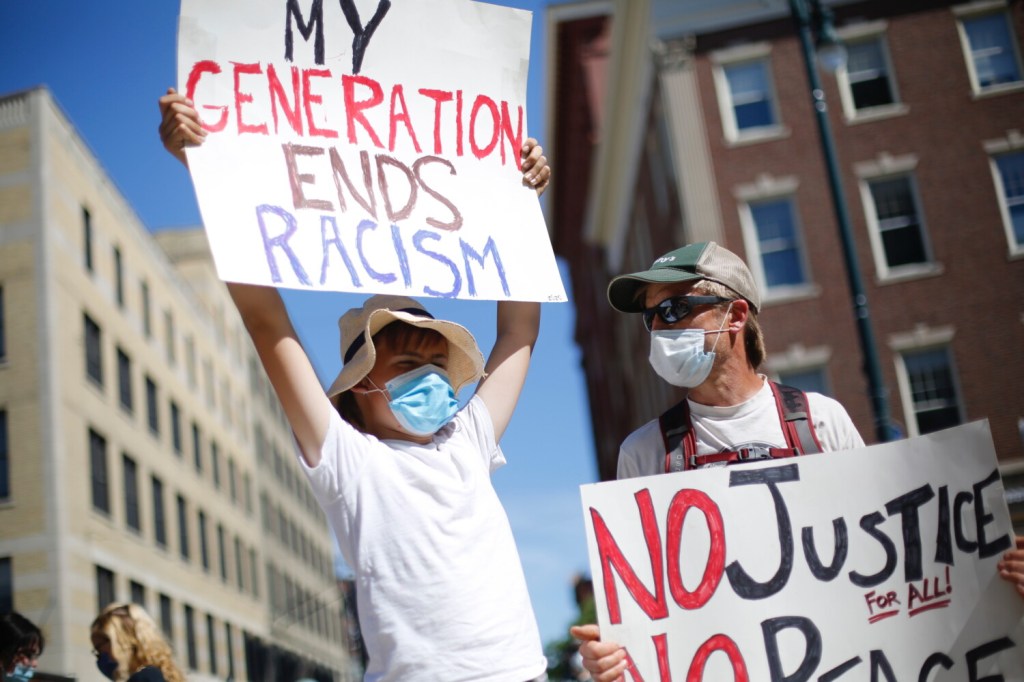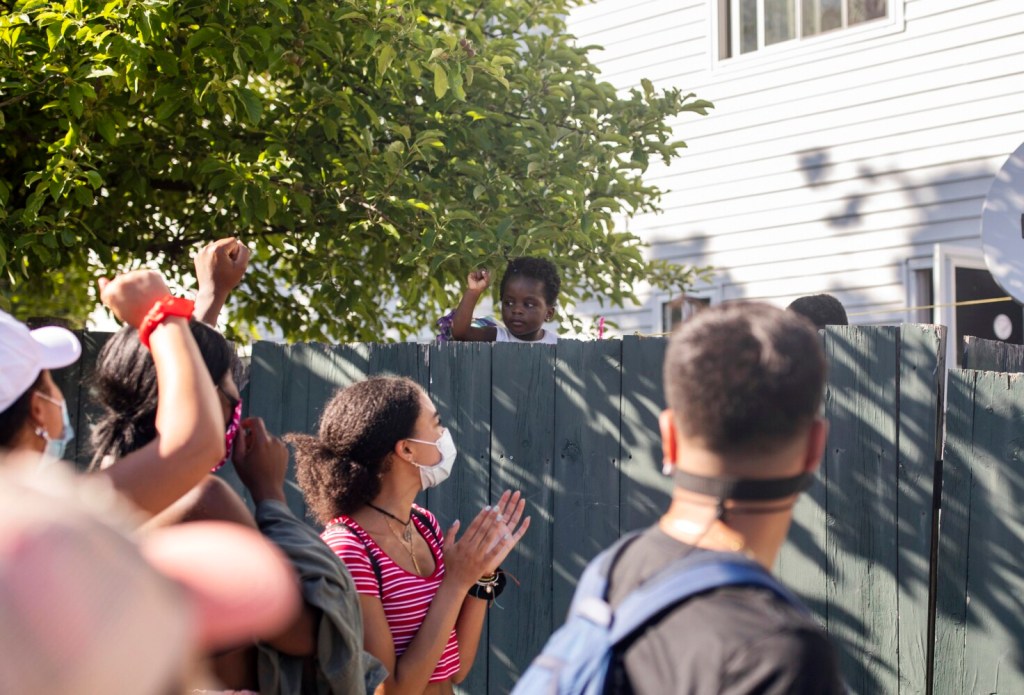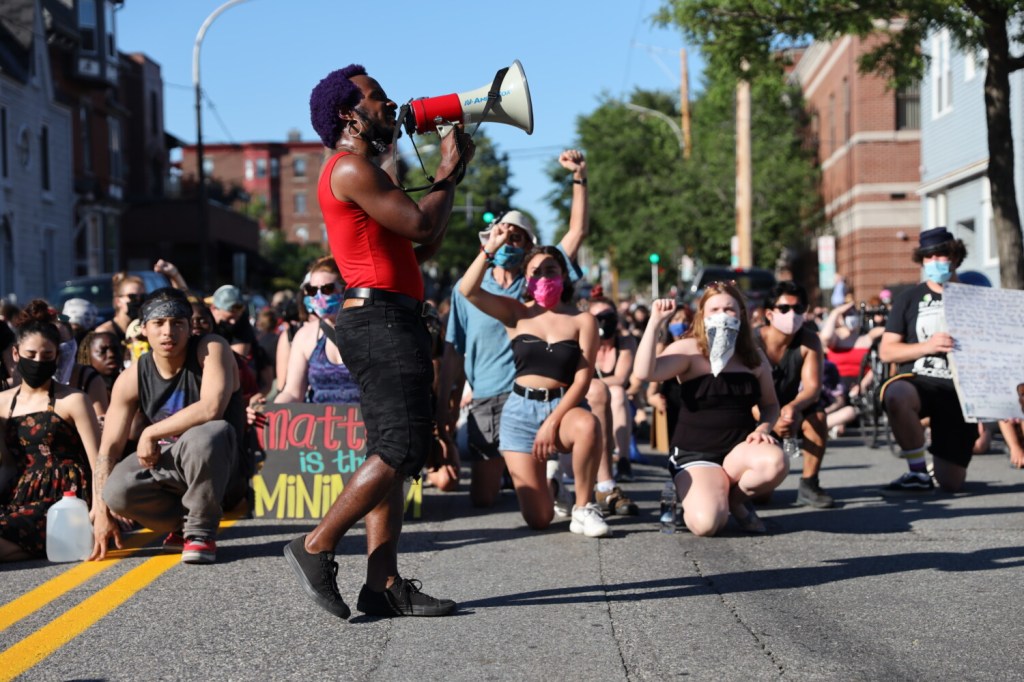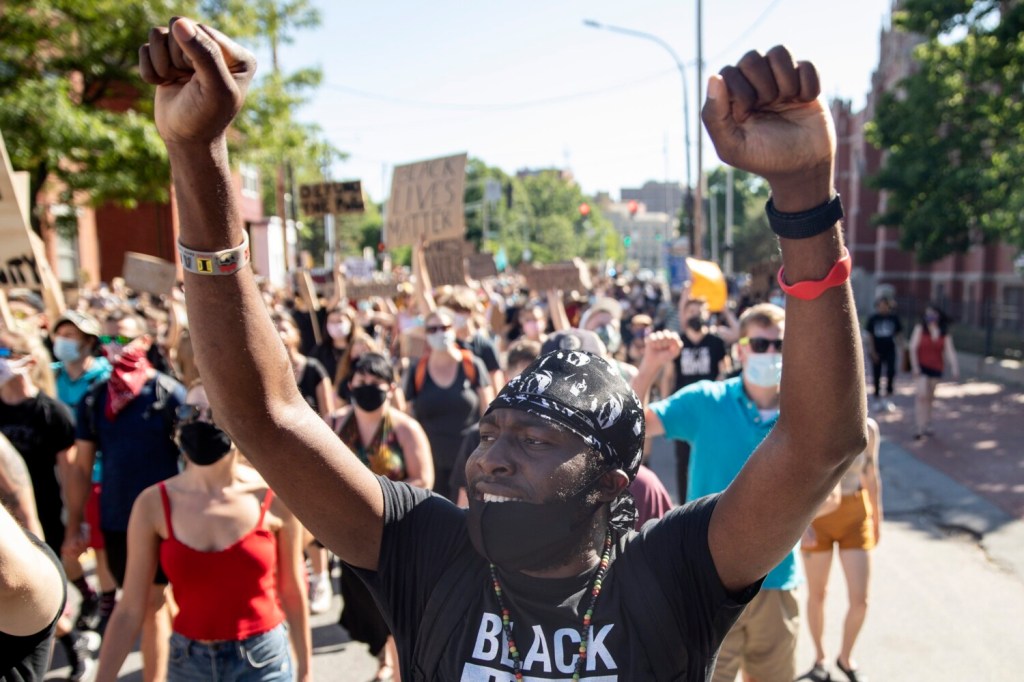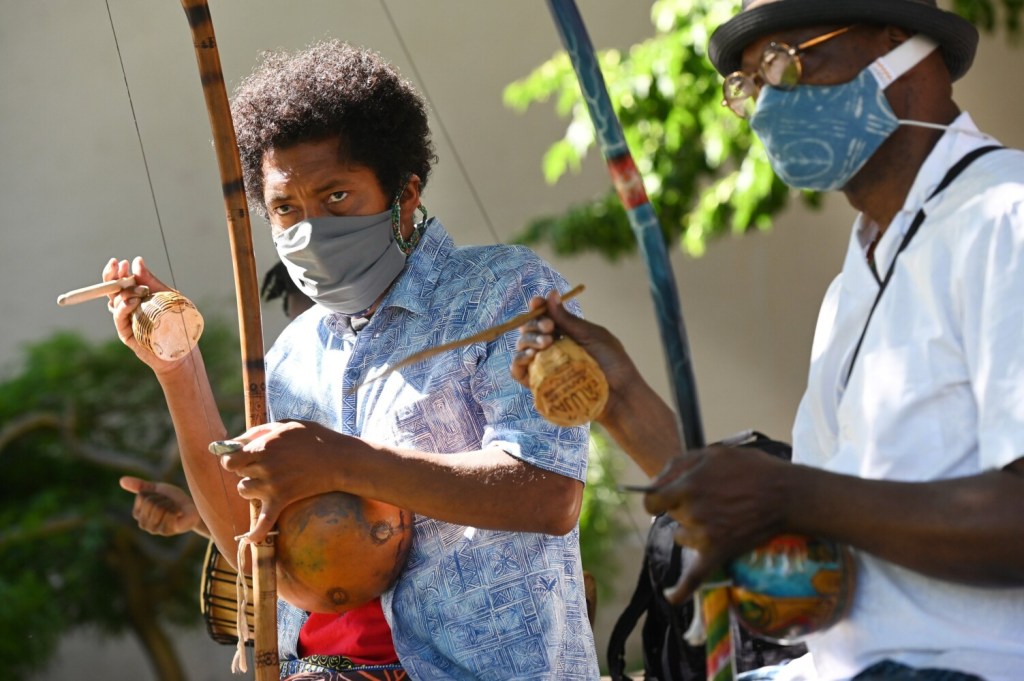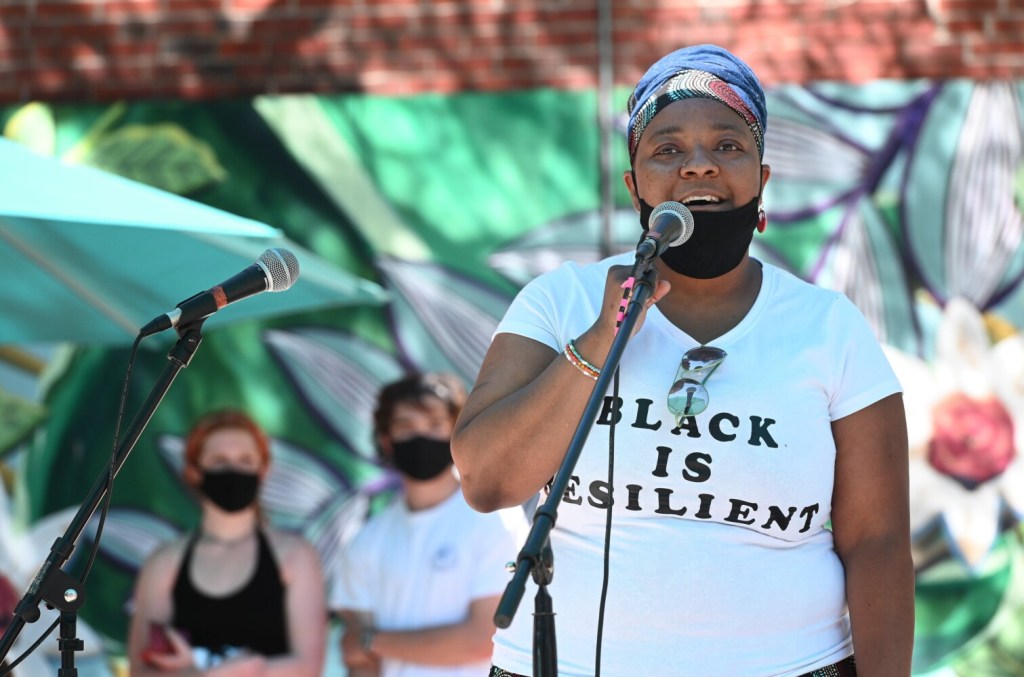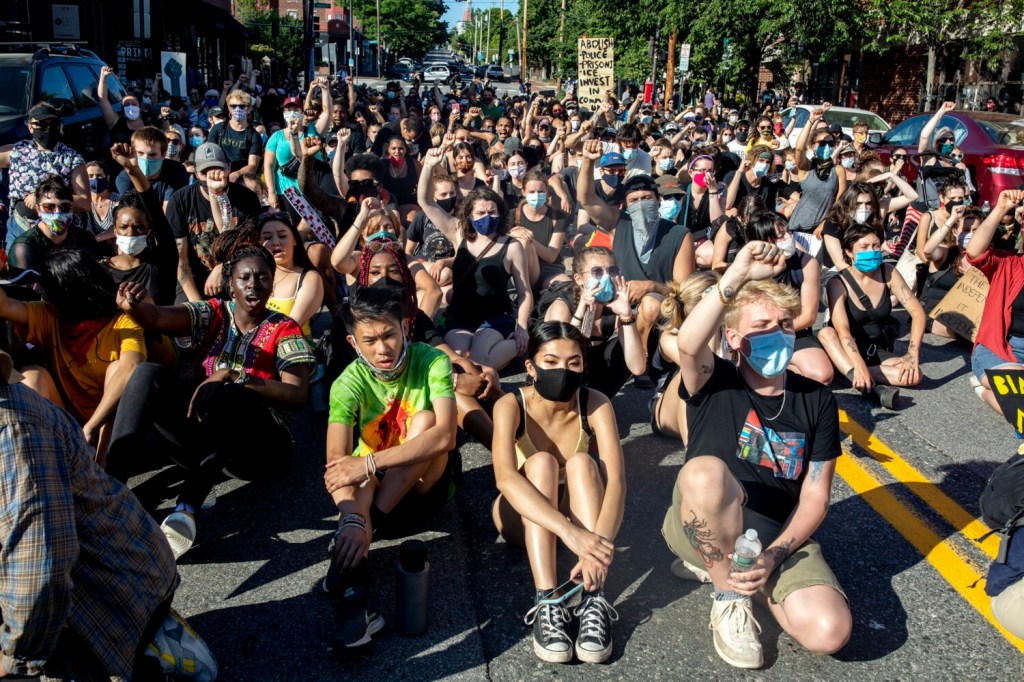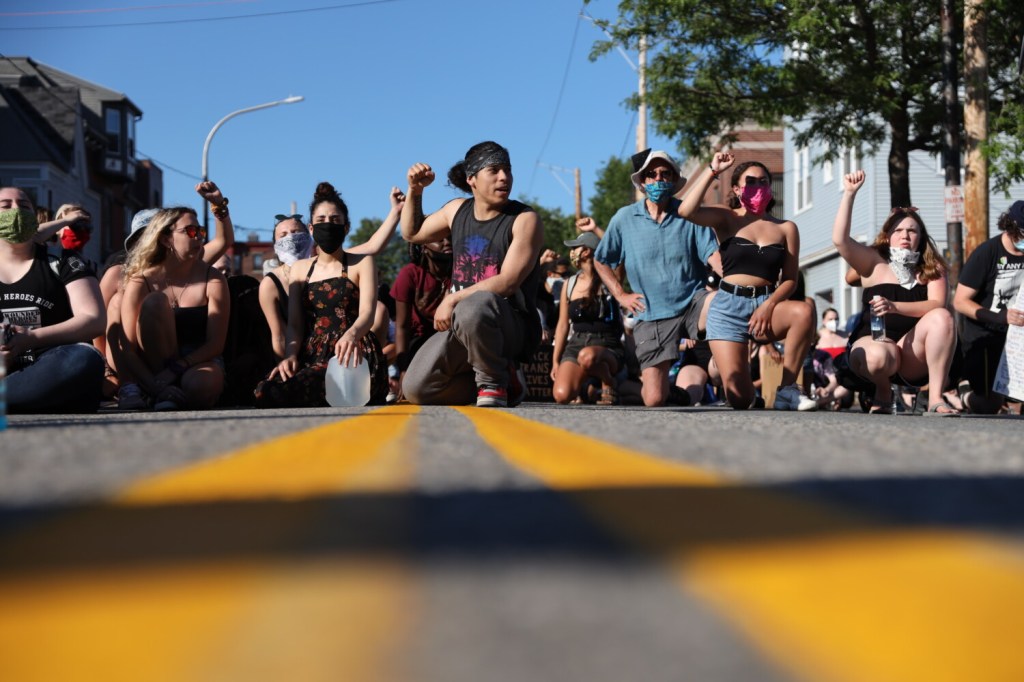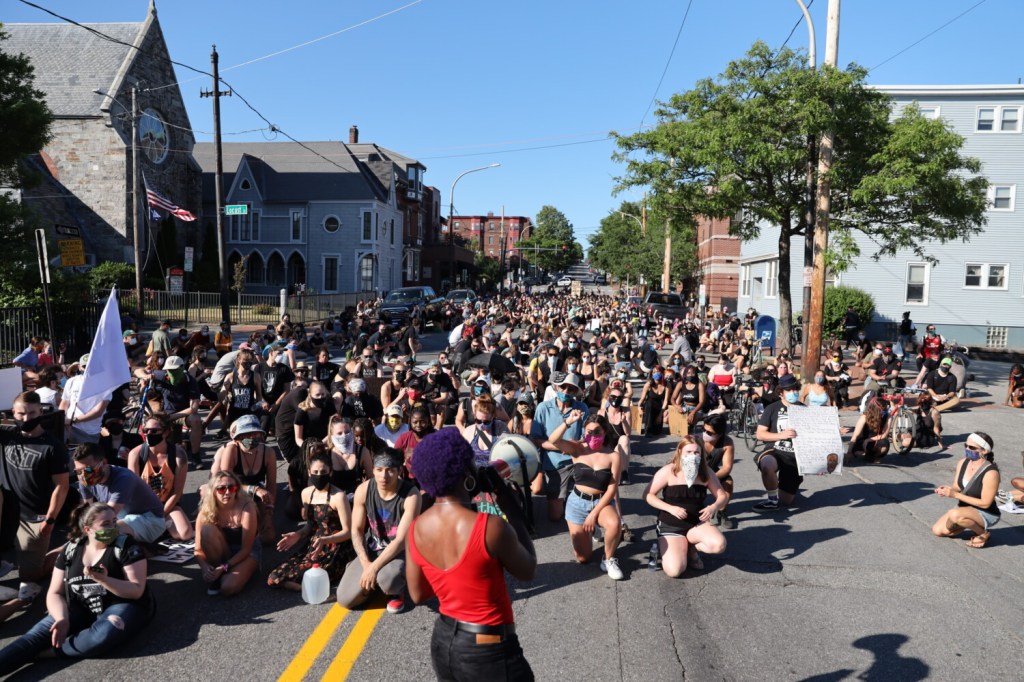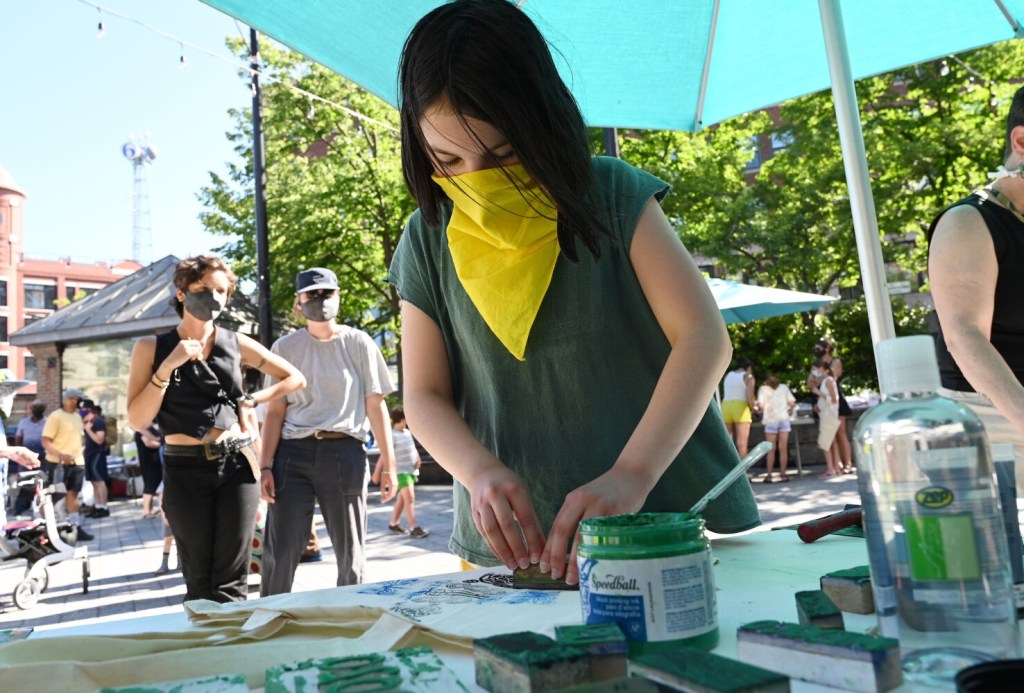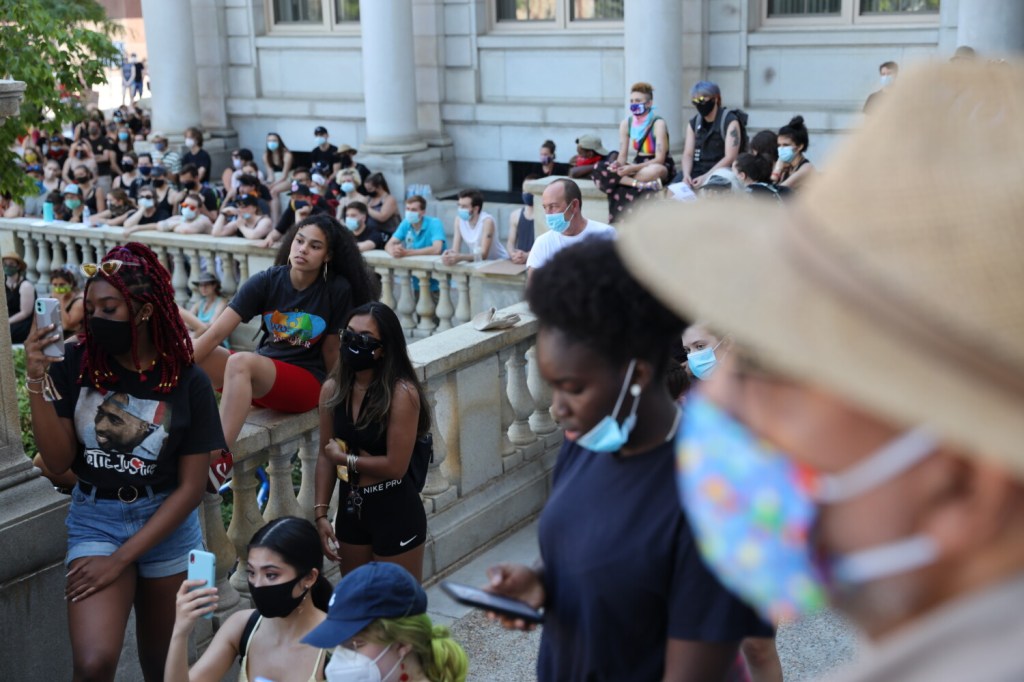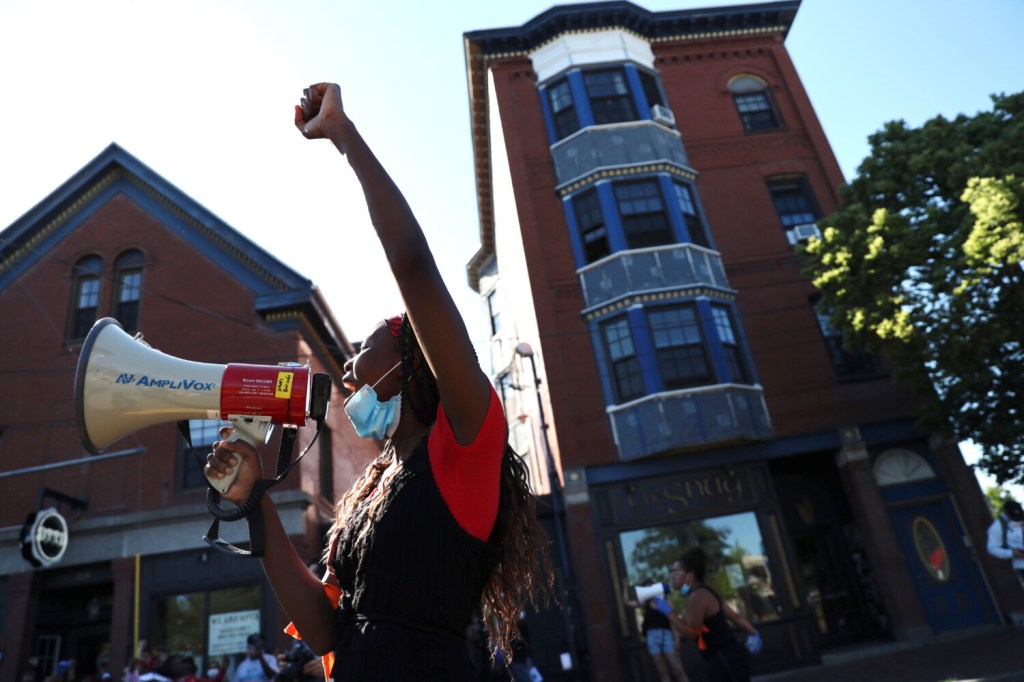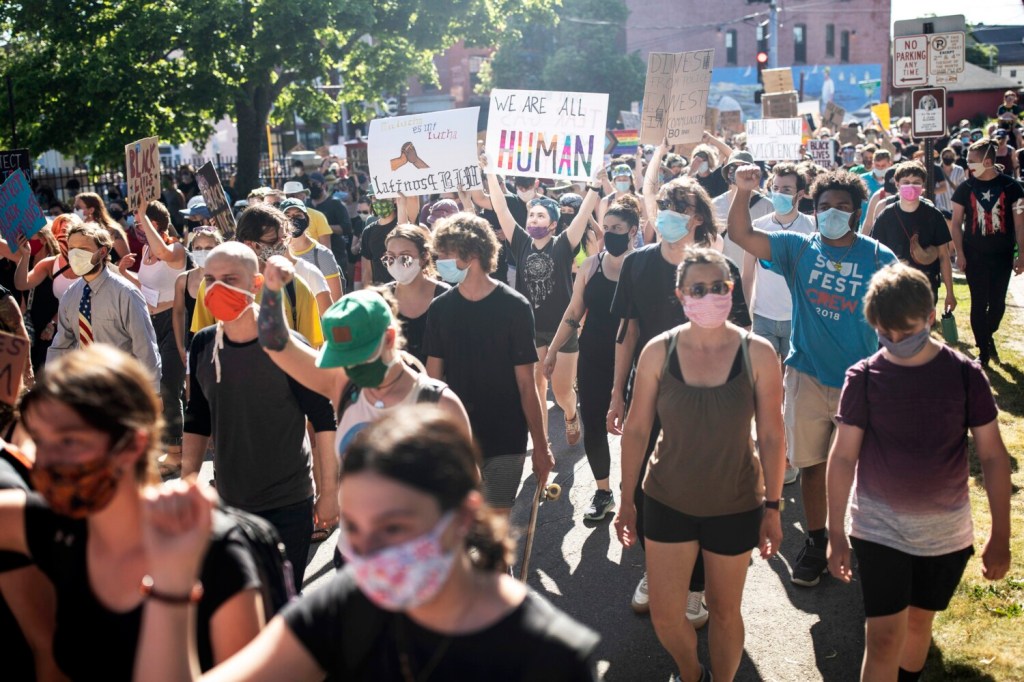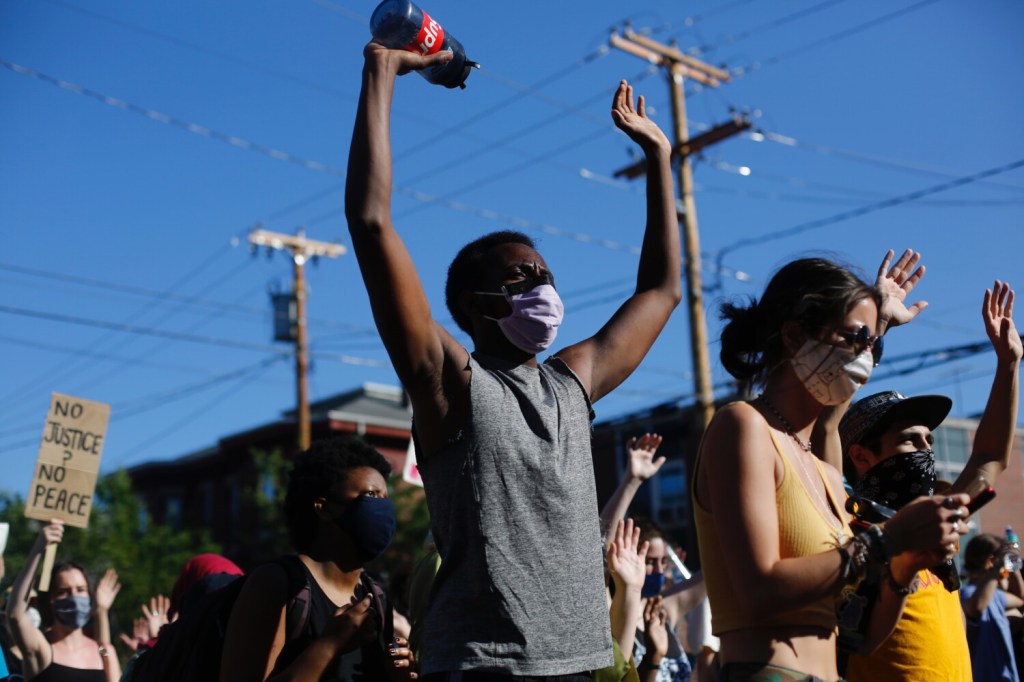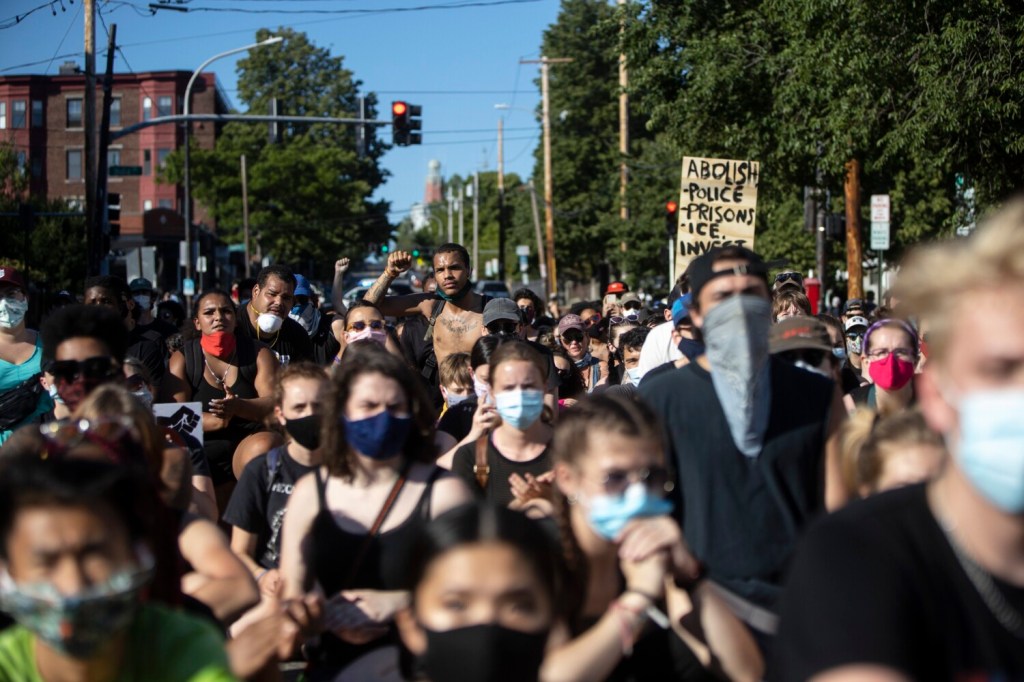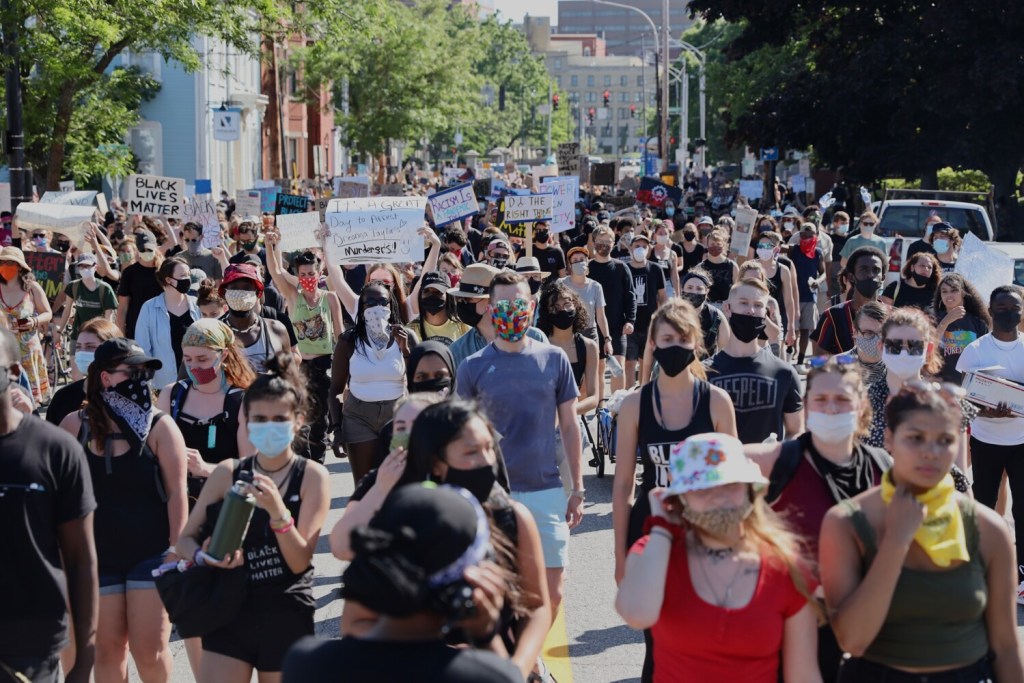Hundreds of people marched through the streets of downtown Portland Friday afternoon and evening during a rally recognizing Juneteenth, the holiday that commemorates the emancipation of African Americans from slavery.
The organized and peaceful demonstration blocked traffic as it moved through the city and included several stops, when protesters kneeled, or lay face down, or stood and listened to speeches and poems. One lengthy stop took place at the historic Abyssinian Meeting House, the third-oldest Black church building in the United States.
Juneteenth is a state holiday that is being celebrated with renewed purpose and fresh awareness this year, after recent high-profile police killings of Black Americans and the resulting global protests calling for criminal justice reform and an end to systemic racism.
With early summer heat in the 80s, protesters of all ages and ethnicities began the rally in front of Portland City Hall on Congress Street, chanting and carrying signs such as “Black Lives Matter” and “My Generation Ends Racism.” Most also wore masks as requested by rally organizers to prevent the spread of COVID-19.

Edward Cubberly, 14, of Waterville, stands with his father, Chris, at a Juneteenth Black Lives Matter rally in Portland on Friday. Derek Davis/Staff Photographer
Cheers rang out as speakers such as Tim Wilson, a three-time appointee to governors’ cabinets and former head of the Maine Human Rights Commission, recalled his experiences as a Black man living in Maine.
Wilson praised young protesters who have picked up the mantle of civil disobedience that he and other activists wore in the 1960s, and he urged them to stay strong as they try to fix many of the same problems.
“I’ve been a part of this world for almost 80 years,” Wilson said. “It isn’t any different. Put your boots on. You’re going to be at it for a while.”
Coordinated by Maine Youth Organizers, the Juneteenth rally and march ran from 3 p.m. to shortly after 9 p.m., ending at Deering Oaks. A Juneteenth arts event was held from 3-6 p.m. at Congress Square Park in Portland.
Rally organizers wearing black and police in SUVs blocked streets as the protest moved through the city. Police made no arrests related to the rally or march, Lt. Jason King said.
Juneteenth marks the day that the last slaves still living in bondage in the United States learned they were free. It happened on June 19, 1865, in Galveston, Texas, where Union Gen. Gordon Granger read General Order No. 3, which said “all slaves are free” by proclamation of President Abraham Lincoln.
Lincoln had signed the Emancipation Proclamation on Sept. 22, 1862, more than a year into the Civil War, and it went into effect Jan. 1, 1863. But it wasn’t until after the war ended, in the spring of 1865, that Union troops traveled to the hinterlands of southwest Texas and Granger announced publicly that the proclamation would be enforced.
Friday’s march began around 4:30 p.m., when the chanting crowd started moving from City Hall up Congress Street to Portland’s East End neighborhood, where the Abyssinian Meeting House has been under restoration for more than 20 years.
Congress Street, Portland, Maine. #BLM #portlandmaine pic.twitter.com/blvwQJ82UW
— Derek Davis (@derek_ddavis) June 19, 2020
Built in 1828, the Abyssinian is the nation’s third-oldest meetinghouse constructed by a Black congregation, after churches in Boston and Nantucket. It’s listed on the National Register of Historic Places and recognized as a northern hub of the Underground Railroad and the anti-slavery movement. In 2013, the National Trust for Historic Preservation listed the Abyssinian as one of the most endangered historic places in the United States.
The Committee to Restore the Abyssinian has raised and spent just over $1 million to save and restore the timber frame building from its brick-and-mortar basement to its hand-hewn roof beams. And it needs an additional $1 million or so to finish the restoration before the building’s 200th anniversary in 2028.
Benadita Zalabantu, a Portland High School student, stood in front of the Abyssinian, before a crowd that filled Newbury Street, and read from her poem, “Drop of Melanin and Blood,” about racial bias and the experience of being a Black person in America:
“At a young age, little black boys are taught how/they should and shouldn’t act when they’re stopped by the cops./Black boy, breathe. I want you to breathe./Black boy, you will be treated as a problem before they realize you’re human./Black boy, keep your hands visible./Black boy, be scared, but not too scared./Black boy, you will matter.”
From the Abyssinian, the protesters moved back to Congress Street, where they stopped and kneeled, chanting “No justice, no peace” and calling out the names of Black people recently killed by police. They included George Floyd, whose death May 25 in Minneapolis resulted in the firing of four police officers. Derek Chauvin was charged with second-degree murder in Floyd’s death and the three other officers at the scene were charged with aiding and abetting second-degree murder.
The march halted again on Mellen Street at Park Avenue, where protesters lay face down for a moment of silence, then it proceeded across the street to Deering Oaks. In the tree-lined park, protesters read poems, gave speeches, performed dances, registered voters and collected signatures for ballot initiatives.

A crowd gathers for a Juneteenth Black Lives Matter rally in Portland on Friday. Derek Davis/Staff Photographer
Juneteenth became a state holiday in Maine in 2011. It is now recognized in every state except Hawaii as an official holiday or day of observance. It remains unrecognized as a national holiday despite past efforts to gain federal acceptance.
On Thursday, several U.S. senators announced they will introduce legislation to make Juneteenth a federal holiday. State Rep. Rachel Talbot Ross, D-Portland, is developing a bill that would make Juneteenth a paid state holiday.
Staff Photographers Brianna Soukup and Derek Davis contributed to this report.
Comments are not available on this story.
Send questions/comments to the editors.



